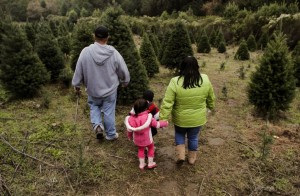By Amy Graf
Christmas trees are the latest casualties of California’s devastating drought.
Northern California tree farmers are reporting that this year’s crop is suffering due to the water shortage.
“Ninety percent of the seedlings we planted last year died,” says Jim Beck, who owns Patchen California Christmas Tree Farms in the Santa Cruz Mountains. “We simply couldn’t get water to them in time.”
Beck closely monitors the mature Douglas Firs on his Los Gatos farm where people come to cut down their own trees. He inspects and measures their needles to determine signs of stress.
In a typical year, the needles grow an inch and a quarter to an inch and a half.
“This year we saw about three-quarters-of-an-inch growth,” said Beck, who has owned the farm with his wife, Marina, for 46 years.
What’s more, Beck said his trees only grew a little over a foot this year while in past seasons they’ve usually gained about two and a half feet.
Beck decided to not raise his prices this year and a six-to-seven-foot tree is selling for $60 as it did in 2014. But he says the trees’ stunted growth is impacting him financially and he’s counting on El Niño as his trees’ sole water supply is rain.
“I hope these weather reports are right,” he said, “But I’m not holding my breath.”
California is in the midst of a four-year drought, the worst in 106 years. Low water supplies are wreaking havoc on agriculture and Christmas trees are the latest victims to make news headlines. Some varieties of established adult trees are growing more slowly while seedlings that require more water are dying all together.
Consumers cutting down trees at those boutique farms known for serving hot chocolate and offering tractor rides will find a smaller selection. Those shopping at city lots and big retailers such as Whole Foods and Home Depot will encounter higher prices due to a shortage of trees.
Many California lots and farms purchase trees wholesale from Oregon, the nation’s largest supplier, but like California, the state to the north is in the midst of a drought that’s exacerbating the situation.
“Trees are indeed more expensive this year due to the drought,” Whole Foods Regional Produce Coordinator Taryn Wolf said. “Fewer trees were planted and the wholesale cost rose significantly.”
Ginger and Jim Armstrong grow prized silver tips for wholesale on wild land outside Auburn. This year they’re not even selling these trees. “We just weren’t sure how much water these trees received and we were worried about needle retention,” Ginger said. A tree that’s starved for water is dry and brittle, she said, and after being cut, they can drop their needles within days.
The Armstrongs also own Snowy Peaks Tree Farm and this part of their business is open. They monitor the trees on the you-cut farm closely and Ginger said the fall rain provided the crop with a boost of growth. “We still noticed some trees that were stunted though,” Ginger said. “We usually see some of these because of soil issues but this year there were more and we’re certain it’s a water issue.”
At Reindeer Ridge in Sebastopol, Debbie Garavalia and her husband Paul are doing everything possible to keep their trees alive.
They typically water their trees in the summer as they get less rain than the Sierra foothills and Santa Cruz Mountains. But this year, they rented water trucks and used hoses to hand water seedlings. They also set up a drip irrigation system and supplied water through spring, summer and fall. Most of the crop is thriving, she says, but the tall trees are clearly stunted.
“I’ve never have seen anything like this,” said Garavalia, who has owned the lot since 1985. “I’ve never gone through such a long extended time without water.
“When we drive around the trees on the tractor, dust is blowing because the ground is so dry. It’s crazy.
“We event brought in shavings to keep the dust down and try to keep the moisture in, if there’s any moisture to be kept in.”



